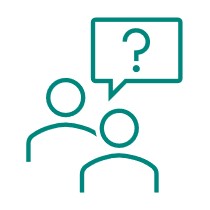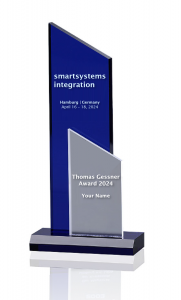On this page our SSI speakers receive all information about conference dates, speaker tickets and hotel rooms, schedule for scientific contributions, submission options, the selection process, oral and poster presentations, the conference tracks, as well as the SSI Awards.
The most important questions are answered under FAQ for authors.
Speaker tickets and hotel rooms
All information on booking speaker tickets and discounted hotel rooms in Hamburg can be found under the menu item „Participants“.
Tip: Book your accommodation by mid-February and benefit from our Early Bird Speaker Ticket until the end of February.
There will be 3 Speaker Award Winners at SSI 2024!
While the best poster is selected by all conference participants and announced at the end of the conference, the Best Paper Award winner is nominated by the committee. The award winner will be selected from 7 to 10 candidates based on their paper and will be announced a few weeks after the conference. The award will be presented to the winner at the next Smart Systems Integration Conference.
Best Paper Award
The Best Paper Award of the SSI, which took place in Bruges on 28-30 March, 2023 goes to Tom Enderlein, Center for Microtechnologies at Chemnitz University of Technology, for his paper „Hollow Microneedle Fabrication and Characterization for Interstitial Fluid Extraction in Minimally Invasive Sensors“. Tom Enderlein works at the Center for Microtechnologies at Chemnitz University of Technology. The uniqueness of the work, which was carried out as part of the European „SIXTHSENSE“ project, lies in the successful production of microneedles using laser micromachining and hot stamping. They enable painless penetration of the skin and allow the multiple removal of the smallest amounts of fluid from the skin tissue, which in particular enables minimally invasive sensor technology in the healthcare sector. The work is characterized in particular by the comprehensive characterization of the specially manufactured microneedles for multiple applications. The prototypes created in the project are now being further tested on pigs so that they will soon be available for applications in human medicine. This technology leverages applications in personalized medicine, which is seen as particularly promising in the context of smart sensor technology, sensor data fusion and AI for the informed and specific detection of human diseases.
Best Poster Award
The most exciting poster contribution will be chosen by the conference participants directly on site. Last year’s winner was Sarah Seifi from Infineon Technologies Munich for her poster „Detection of Sensor-To-Sensor Variations Using Explainable AI“.
Thomas Gessner Award
The Thomas Gessner Award went to Dr Roberto La Rosa from STMicroelectronics for his excellent contribution „Strategies, Techniques and Systems for powering low maintenance and battery-free devices through Energy Harvesting and Wireless Power Transfer“. The „Thomas Gessner Award“ is endowed with 1,500 euros and the winner receives free participation in the conference in addition to the prize money.
Get all the information an apply for the Thomas Gessner Award under the following link:
Thomas Gessner Award
Timing for scientific papers
▪ Abstract submission started November 7th, 2023
▪ Deadline for abstract submission: January 15th 2024
▪ Selection by Committee January 31st, 2024
▪ Submission of Full Paper March 4th, 2024
▪ First Peer Review April 5th, 2024
▪ First revision Revised Paper April 10th, 2024
Submission opportunities
There are two opportunities for papers.
1. Scientific papers can be submitted for publication in IEEE Explore®. Full scientific papers (min. 4 pages) undergo a rigorous peer review process.
2. Industry and European Projects are specifically encouraged to submit papers. There is no full paper required, but it is possible to publish a non-scientific paper in the conference proceedings, exclusively.
Selection Process
The committee will review all the abstracts. Submitted abstracts are selected for oral or poster presentation. Conference proceedings will be available online.
Oral and Poster Presentations
To highlight the networking aspect, special focus is put on a centrally dedicated poster session and selected oral presentations in two parallel tracks. The conference app guides you through the conference and enables you to give feedback on the current presentation. All scientific oral and poster presentations will be included in the conference proceedings. The proceedings will be additionally published online and open access.
Tracks
- Track 1:
- Recent developments in the building blocks (components) of smart systems
This track contains new and innovative components of smart systems without any technology limitations, however clear link to applications via further system integration
- Single components and new sensor technologies
-
- Advanced micro / nano and smart power technologies
- Novel concepts for smart sensing, control, actuation and energy supply
- Disruptive innovation in terms of functionality, accuracy, autonomy, automation, cost, size, …
- Novel topics of smart systems, such as quantum sensing, photonic integrated circuits and new materials
- Track 2:
- System integration aspects concerning hardware and software
This track is focused on the different integration aspects like:
-
- Integration of different functionalities (energy management, communication, data analysis, knowledge based data processing, …)
- Smart low-cost approaches including roll-to-roll technologies and printed functionalities
- Green, environmentally-friendly, recyclable aspects of system integration
-
- 2.5/3D integration, interconnect technologies & packaging the electronics and all associated sensors/actuators etc.
- Heterogeneous integration for Smart Systems
- Software integration, Firmware
- Reliability and security aspects (Methodologies and concepts for reliability, safety, and security)
- Track 3:
- Application Domains
This Track covers all application domains from healthy living, Food, biomedical to Mobility, Energy and Industry
- Smart systems with a TRL level of min. 6 for dedicated application within the different domains
- This includes
-
-
- AI based smart sensor systems and networks, control units and drives incl. aspects such as power electronics, as well as communication systems for all application fields
-
- Secure, reliable, decentralized, multi-modal systems
-
-
- Ultra-flexible, high-performing, energy and resource efficient, and collaborative systems for different applications – digital twins supporting from design to customer service
-
- Track 4
- “Strategy and Business Creation”
Track 4 focusses on business development and technologically founded market forecasts. This year, the strategic aspect focusses on internationalization, whereas the topical focus is out on AR & VR solutions in the SSI context.
- Policy talks will be invited. The CfP is open for following topics:
-
-
- International and European contributions to smart systems integration
-
- Smart System solutions created by start-ups and SMEs
- Results of industrial partners and impact gained in funded European projects
-
-
- Presentations of European and local networks CSAs related to SSI topics, Digital Innovation Hubs
-
- Track 5
- Special track “Artificial intelligence in smart systems”
This track is a special track for the SSI2024 – it will be introduced by a general keynote and can be extended by a panel of experts. We are looking for abstract submissions on the following subtopics:
-
- Edge AI hardware: e.g. edge AI frameworks; novel AI architectures for embedded systems, e.g. RISC-V; spiking neuronal networks; …
- Algorithms for smart systems: sensor data fusion and autonomous systems; hybrid and physics-informed AI; …
- AI application challenges: mobility, smart production, agriculture, smart cities, biomedical, energy, …
- Human acceptance of AI: explainability and trustworthiness at the edge; data privacy; sustainability
You will need to provide a 100-200 word abstract with a short, specific Title. Be as specific as possible as to what you will discuss in your paper – technologies, innovations or strategies covered etc. to evaluate your submission by the conference committee.
Abstracts should concisely report the aims and outcomes of your research. Your abstract should be fully understandable on its own to someone who hasn’t read your full paper or related sources.
Call for papers
Become a speaker at SSI 2024 - submit a paper until January 15th 2024
Author FAQs

- What is a good abstract?
A good abstract raises clear expectations on the kind of results, but it should not contain results, yet.
It should be interesting to the SSI community in general and addresses the scope of the conference (track).
It should be written clear and concise. - How is my abstract rated?
Your abstract is evaluated among the folloqing criteria:
* Innovation (30%)
* Technical Content (as far as applicaple, 30%)
* Relevance - Addressing the Scope of Conference (30%)
* Writing style, structure, language skills (10%)
with four marks "excellent", "good", "average", and "poor".You won't see the rating, but referees are encouraged to give a short feedback about the abstract.
- Am I eligible to publish a full / journal paper?
Each accepted submission, poster as well as oral presentations, are eligible to submit a paper to the conference proceedings.
You have two choices: You may
* submit a technical / scientific paper (which involves an in-depth peer-review), which will appear on IEEE (2022 example: https://ieeexplore.ieee.org/servlet/opac?punumber=9901388 ).
* submit a strategic contribution, a non-scientific paper or a scientific work of early stage (without peer review), which will only appear in the proceedings (2022 example: https://doi.org/10.24406/publica-541). - Do I need to publish a full / journal paper?
There is no need to publish a journal paper, but if you wish to disseminate your work, there are two options:
* Scientific papers can be submitted for publication in IEEE Explore (2022 example: https://ieeexplore.ieee.org/servlet/opac?punumber=9901388). Full scientific papers (min. 4 pages) are subject to a rigorous peer review process.
* It is possible to publish a non-scientific paper exclusively in the conference proceedings (2022 example: https://doi.org/10.24406/publica-541). - How is my full paper rated?
Your full paper is evaluated among the folloqing criteria:
* Innovation (30%)
* Technical Content (as far as applicaple, 30%)
* Relevance - Addressing the Scope of Conference (30%)
* Writing style, structure, language skills (10%)
with four marks "excellent", "good", "average", and "poor".You won't see the rating, but referees are encouraged to give a feedback about the full paper for improvement including a clear indication about the status of acceptance.




